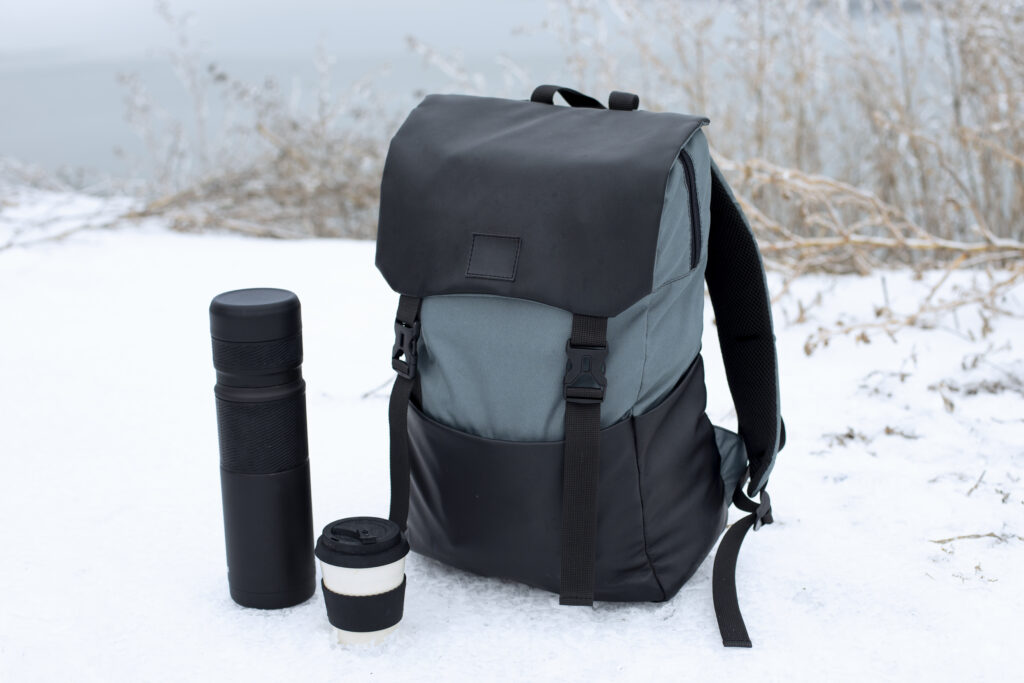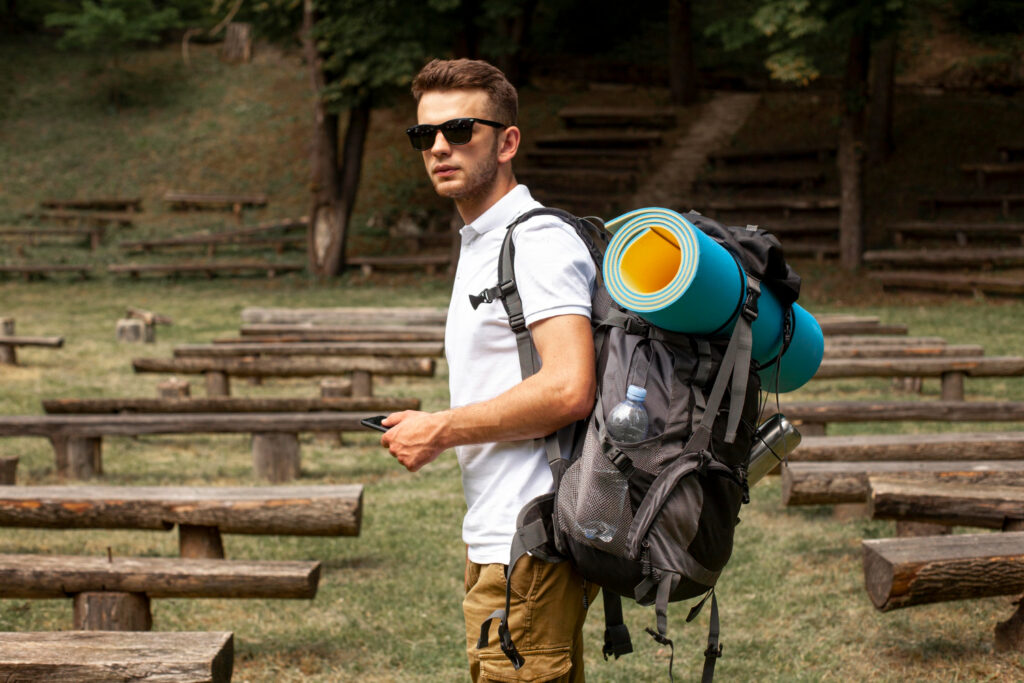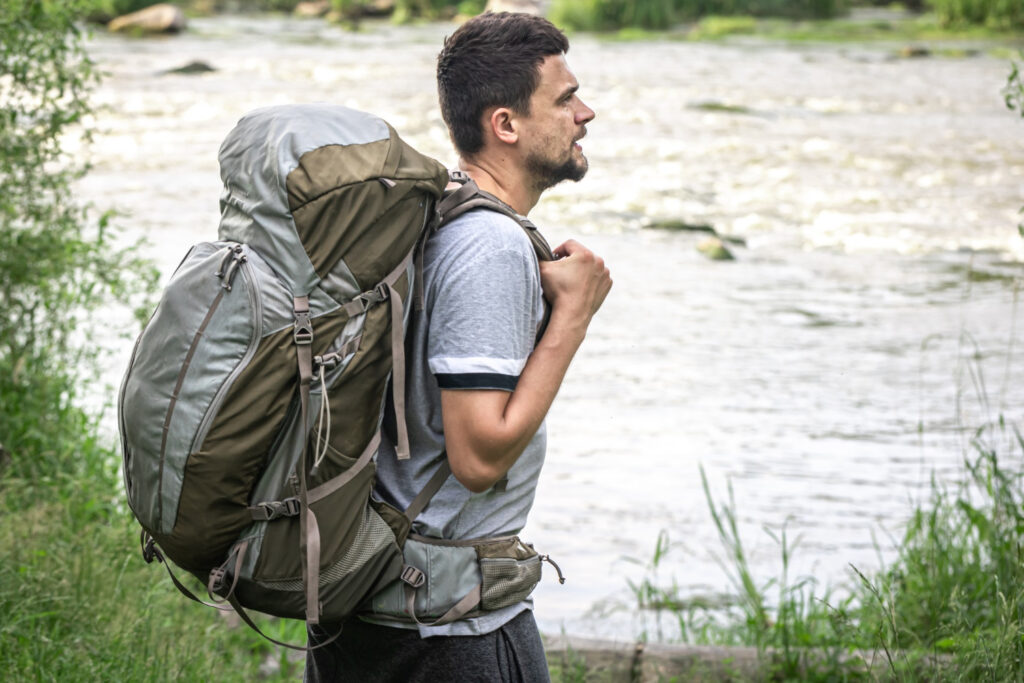Your backpack is a trusted friend when you are heading out for hiking, as it helps carry everything you need. A concern for hiking backpack sizes is legit and finding the right size for the trip will enhance your joyful experience.
Picking the right hiking backpack size is a big decision, sort of like choosing the right buddy for your adventure.
In this guide, we unravel the secrets of picking the right size backpack for hiking, ensuring that it fits your needs and makes your hiking experience the best it can be.
So, let’s dive in and find that perfect backpack size for your next outdoor escapade!
1. Hiking Backpack Sizes for A Day (20-30 liters):
Daypacks consist of the best hiking backpack sizes for day trips, usually with a capacity of 20 – 30 liters, it is the compact powerhouses of the hiking world, and are like your sidekick for short adventures.
Picture a hiking backpack with just enough space – not too big, not too small – perfect for a day out exploring nature or even wandering through city streets.

Versatility for Day Adventures:
- Ideal for day hikes, nature walks, or city explorations where you don’t need a ton of gear.
- Around 20 to 30 liters of space strikes a balance – enough room for essentials without being bulky.
Essentials at Your Fingertips:
- Daypacks are designed to carry the basics – water, snacks, a light jacket, sunscreen, and maybe a camera.
- Multiple pockets and compartments help keep things organized, so you can grab what you need without rummaging.
Lightweight and Maneuverable:
- Being smaller and lighter, daypacks allow for easy movement and flexibility.
- Comfortable shoulder straps and a snug fit make them perfect for quick, on-the-go adventures.
City-Ready Style:
- Not just for the trails, daypacks often come in stylish designs, making them great for urban outings.
- Whether you’re hiking a trail or exploring a new city, a daypack keeps you hands-free and ready for anything.
Great for Beginners:
- If you’re new to hiking, a daypack is a friendly starting point – not overwhelming in size but still incredibly useful.
- They introduce you to the joy of hiking without the need for heavy gear.
Budget-Friendly Option:
- Generally more affordable than larger backpacks, daypacks offer a budget-friendly entry into the world of hiking gear.
- Perfect for occasional hikers or those testing the waters before committing to larger adventures.
Also read: How to Wear a Hiking Backpack
2. Hiking Backpack Sizes For Weekend Trips (30-50 liters):
A weekend or a couple of days hiking trip requires a backpack size that is not too small and not too large, but just right for those short getaways.
These hiking backpack sizes range from 30 to 50 liters and offer the sweet spot between practicality and space for a comfortable and enjoyable weekend in the great outdoors.

Have a Balanced Capacity:
- With a capacity ranging from 30 to 50 liters, these backpacks strike a balance, allowing you to carry additional clothing, a sleeping bag, and basic camping gear.
- Provides versatility for various climates and terrain without being too cumbersome.
They are Versatile for Various Activities:
- Well-suited for a range of outdoor activities, from camping and hiking to short backpacking journeys.
- Multiple compartments and pockets ensure organized packing, allowing you to access what you need without unpacking everything.
They Provide Comfort With Functionality:
- Typically designed with comfortable shoulder straps and a hip belt to distribute weight evenly, ensuring a pleasant and pain-free experience.
- Offers more features compared to daypacks, such as hydration reservoir sleeves and additional attachment points.
A Bridge to Larger Adventures:
- Weekend backpacks serve as a transitional step for those ready to venture beyond day trips but not yet ready for extensive multi-day hikes.
- Allows hikers to experiment with slightly larger loads and get a feel for backpacking without committing to a full-sized backpack.
Suitable for All Skill Levels:
- Whether you’re a beginner or a seasoned hiker, weekend backpacks are adaptable to various skill levels, providing enough space for essentials without overwhelming novice users.
Also read: What is the Difference Between Trekking and Hiking Backpacks
3. Hiking Backpack Sizes for Extended Trips (50 liters and above):
Extended trip backpacks step onto the hiking stage as the heavyweights, ready to accompany intrepid adventurers into the realms of extended explorations lasting a week, several weeks, or even months.
These hiking backpack sizes vary from 50 liters and above, these backpacks for hiking are purpose-built to house everything needed for a prolonged stay in the great outdoors.

Designed for Extended Journeys:
- Tailored for multi-day and extended trips, these backpacks provide ample space for gear, clothing, and supplies needed for prolonged adventures.
- Ideal for hikers tackling long-distance trails, through-hiking, or embarking on extended camping expeditions.
Maximum Capacity, Maximum Versatility:
- Offering 50 liters and beyond, these hiking backpacks accommodate a vast array of equipment, from multiple changes of clothing to sleeping bags, tents, cooking gear, and other essentials.
- Multiple compartments and pockets enhance organization, ensuring easy access to specific items without unpacking everything.
Comfort and Load Distribution:
- Engineered for comfort during extended wear, extended-trip hiking backpacks feature advanced support systems such as adjustable shoulder straps, hip belts, and load lifters.
- Distributes weight evenly across the body, minimizing strain and fatigue during prolonged treks.
Specialized Features:
- Packed with features to enhance functionality, including hydration reservoir sleeves, rain covers, and additional attachment points for trekking poles, ice axes, or other specialized gear.
- Designed to accommodate specific needs for extended journeys, ensuring hikers are well-equipped for diverse terrains and weather conditions.
Customizable for Individual Preferences:
- Often designed with adjustable and customizable features, allowing users to tailor the backpack to their specific preferences and body dimensions.
- Enables a personalized fit that enhances comfort, especially important during extended periods of wear.
Serious Gear for Serious Hikers:
- Extended trip backpacks are the go-to choice for seasoned hikers and outdoor enthusiasts tackling challenging trails and immersive backcountry experiences.
- Suited for those who prioritize self-sufficiency and need to carry all necessities for an extended period away from civilization.
Also read: How to Attach a Trekking Pole to a Backpack in 7 Steps
What Do You Need to Consider For A Perfect Backpack Size For Hiking
1. Consider Your Gear
When picking a backpack for hiking, it’s like finding a home for your things. Think about what you need for your adventure.
If it’s just basics like water, snacks, and a jacket, a small daypack is good.
If you’re adding more stuff like extra clothes or camping gear, a bigger weekend backpack works. And if you’re going on a big trip with lots of gear, you need a really large backpack.
Also, if you have special things like a camera or tools, make sure the backpack has the right spots for them.
The key is to find a size that fits all your stuff comfortably without making the backpack too heavy.
This way, your backpack becomes a perfect match for your adventure, making it easy to carry and ensuring you have everything you need.
2. Fit and Comfort
When it comes to your backpack, it’s like finding the perfect pair of shoes – it has to fit just right for a comfortable journey.
Look for backpacks with adjustable straps for your shoulders, hips, and chest, so you can make it fit your body.
A well-fitted backpack spreads the weight evenly, making it easier on your back and shoulders during long hikes.
It should also follow the shape of your back, hugging it comfortably without causing any discomfort.
Make sure the backpack has good airflow, so you don’t get too sweaty on hot days. Some backpacks even have special straps to help adjust the weight as you walk.
Before you head out on a big hike, try on your loaded backpack to make sure it feels comfy and doesn’t cause any problems.
The goal is to make your backpack feel like a second skin, so you can enjoy the beauty of the outdoors without any unnecessary discomfort.
3. Terrain and Duration
Picking the perfect backpack depends on where you’re going and how long you’ll be out there. If you’re exploring rough and bumpy trails, get a strong backpack with tough materials.
Smaller backpacks around 20-30 liters are great for quick trips on easy trails.
For journeys through different places, like trails and off-path spots, a mid-sized backpack with 30-50 liters is versatile and has room for a bit more stuff.
But if you’re planning a big adventure that lasts many days and covers various terrains, you need a tough backpack with 50 liters or more.
Think about the weather too – some backpacks are good for rain, and others are better for hot days.
Also, consider how long you’ll be out; shorter trips need fewer things, while longer ones need more. Your backpack should match your adventure, making it easier to enjoy every step along the way.
Also read: 13 Reasons Why Organized Backpack is Important?
What to Look For When Buying a Backpack For Hiking
When buying a backpack for hiking, several key features and considerations can significantly impact your overall hiking experience.
Here’s a comprehensive guide on what to look for:
1. Capacity:
Consider the duration of your hikes. Daypacks (20-30 liters) are suitable for short trips, weekend backpacks (30-50 liters) for two to three days, and extended trip backpacks (50 liters and above) for longer adventures.
2. Fit and Comfort:
Ensure adjustable shoulder straps, hip belts, and chest straps for a customizable fit. A well-fitted backpack minimizes strain and discomfort during hikes.
3. Frame Type:
Choose between internal and external frames. Internal frames offer a streamlined design and are suitable for most hikers, while external frames are better for carrying heavy loads.
4. Weight:
Opt for a lightweight backpack, especially if you’re aiming for long hikes. Lightweight materials contribute to a more comfortable trek.
5. Material and Durability:
Look for durable materials like ripstop nylon or polyester. Reinforced seams and sturdy zippers enhance the backpack’s longevity, particularly for rugged terrains.
6. Compartments and Pockets:
Multiple compartments and pockets aid organization. Consider the accessibility of these compartments, ensuring easy reach to essential items.
7. Water Resistance:
Choose a backpack with water-resistant or waterproof materials, especially if you plan to hike in rainy or wet conditions. Some backpacks come with integrated rain covers.
8. Ventilation:
Ventilated back panels or mesh-covered padding enhance airflow, preventing excessive sweating and providing comfort during warmer hikes.
9. Adjustability:
Features like load-lifting straps and adjustable sternum straps allow you to fine-tune the fit based on the terrain and the contents of your backpack.
10. Specialized Features:
Consider features specific to your needs, such as hydration reservoir sleeves, attachment points for trekking poles or ice axes, and gear loops for additional equipment.
11. Brand Reputation and Reviews:
Research reputable backpack brands and read reviews to gain insights into the performance and durability of specific models. Personal recommendations can be valuable.
12. Trial Fitting:
If possible, try on the backpack with a load in the store to assess its comfort and fit. Walk around to ensure it feels comfortable, and check for any pressure points or discomfort.
13. Price:
While budget is a consideration, prioritize quality and features over price. A well-built, comfortable backpack is an investment in your hiking experience.
Also read: How to Organize Your Backpack
Can I use any backpack for hiking?
While you can technically use any backpack for hiking, it’s important to consider the specific features and design elements that make it suitable for this outdoor activity.
Hiking involves varied terrain, changing weather conditions, and the need to carry essential gear, so having a backpack designed for these challenges is highly beneficial.
Here are some key considerations for choosing a backpack for hiking:
1. Size and Capacity:
Hiking backpacks come in different sizes and capacities. The right size depends on the length of your hikes and the gear you need to carry.
Daypacks are suitable for shorter hikes, while larger backpacks may be needed for overnight or multi-day trips.
2. Comfort and Fit:
A comfortable and well-fitted backpack is crucial for an enjoyable hiking experience. Look for adjustable shoulder straps, hip belts, and sternum straps.
Many hiking backpacks are available in different sizes to accommodate various body types.
3. Ventilation:
Ventilation is important to prevent excessive sweating and discomfort during hikes.
Some backpacks come with features like mesh back panels or suspension systems that promote airflow and keep your back cool.
4. Durability:
Hiking involves exposure to the elements, rough terrain, and potential abrasion.
Choose a backpack made from durable materials like ripstop nylon or polyester. Reinforced stitching and robust zippers contribute to the overall durability of the backpack.
5. Weather Resistance:
While not all hiking backpacks are fully waterproof, many come with water-resistant features such as water-resistant coatings, rain covers, or durable water-repellent (DWR) treatments.
Consider the weather conditions you might encounter during your hikes.
6. Pockets and Compartments:
Hiking backpacks often feature multiple pockets and compartments for organized storage. Look for a design that allows you to separate and access your gear easily.
External pockets for water bottles, trekking poles, and quick-access items can be particularly convenient.
7. Weight:
A lightweight backpack is generally preferable, especially for day hikes. However, for longer trips, you may need a slightly heavier backpack with additional features.
Strive for a balance between weight and functionality based on your hiking needs.
8. Frame Type:
Hiking backpacks typically come with internal or external frames. Internal frames are more common and provide a sleeker profile, while external frames may offer additional support for heavy loads.
Choose the frame type based on your intended use and personal preferences.
9. Adjustability:
Adjustable features, such as load lifter straps, allow you to fine-tune the fit of your backpack.
These features help ensure that the weight is distributed properly and that the backpack feels comfortable during your hike.
10. Hydration Compatibility:
Many hiking backpacks have hydration sleeves or compartments designed to accommodate a water reservoir.
Staying hydrated is crucial during hikes, and having easy access to water adds to the convenience of the backpack.
Conclusion
Picking the right-sized backpack for hiking is crucial for a comfy and enjoyable outdoor adventure.
For short day hikes, a small backpack (20-30 liters) is enough for basics like water, snacks, and a first aid kit.
Medium-sized backpacks (40-60 liters) are suitable for longer hikes with extra clothing and possibly camping gear.
Large backpacks (over 60 liters) are for multi-day trips with more equipment. It’s vital to find a balance, ensuring you have enough space without carrying too much weight.
Look for features like adjustable straps and a comfy hip belt for a well-organized and accessible backpack.
Choose based on your specific hiking plans, considering factors like the season and weather.
A well-picked backpack sets the stage for a successful and enjoyable hike, letting you focus on the beauty of the trail and the joy of being outdoors.
Frequently Asked Questions
Q1. What size backpack do I need for a day hike?
Ans: For a day hike, a small backpack with a capacity of 20 to 30 liters is usually sufficient. This allows you to carry essentials like water, snacks, a first aid kit, and an extra layer.
Q2. Can I use a larger backpack for a day hike?
Ans: While you can, it’s generally more comfortable to use a smaller backpack for day hikes. A larger backpack might be unnecessary and could lead to carrying unnecessary weight.
Q3. What size backpack is suitable for an overnight hike?
Ans: For an overnight hike, consider a medium-sized backpack with a capacity of 40 to 60 liters. This allows space for extra clothing, a sleeping bag, and possibly a tent or shelter.
Q4. Are there specific backpack sizes for different seasons?
Ans: The size of your backpack can vary with the seasons. In colder weather, you might need extra layers and gear, so a larger backpack could be suitable.
Q5. Can I use a daypack for multi-day hiking trips?
Ans: It’s not recommended for longer trips. Daypacks lack the space needed for camping gear and extra clothing required for multi-day adventures.
Q6. What should I consider when choosing a backpack size for a specific trail?
Ans: Consider the length of the trail, the gear you need, and the weather conditions. Shorter trails may require a smaller backpack, while longer or more challenging trails may necessitate a larger one.
Q7. Is there a one-size-fits-all backpack for hiking?
Ans: No, backpack sizes should be chosen based on individual needs and the nature of the hike. People have different preferences and requirements, so it’s important to find the right fit.
Q8. How do I know if a backpack is the right size for me?
Ans: The backpack should feel comfortable and distribute weight evenly. Straps should be adjustable, and the hip belt should rest on your hips. It’s crucial to try on the backpack and make adjustments as needed.
Q9. Can I use a backpack with a hydration system for all types of hikes?
Ans: Yes, backpacks with hydration systems are versatile and can be used for various hikes. Ensure the backpack size is appropriate for the length and nature of your hike.
Q10. Are there any weight considerations when choosing a backpack size?
Ans: Yes, it’s important to find a balance between having enough space for your gear and avoiding unnecessary weight. Choose a size that accommodates your essentials without overloading you during the hike.

